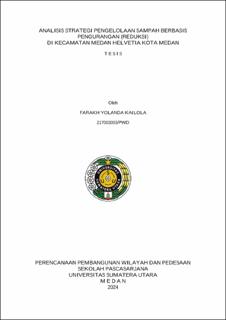| dc.contributor.advisor | Hadinugroho, Dwi Lindarto | |
| dc.contributor.advisor | Thoha, Achmad Siddik | |
| dc.contributor.author | Kailola, Farakh Yolanda | |
| dc.date.accessioned | 2025-02-20T06:56:52Z | |
| dc.date.available | 2025-02-20T06:56:52Z | |
| dc.date.issued | 2024 | |
| dc.identifier.uri | https://repositori.usu.ac.id/handle/123456789/101505 | |
| dc.description.abstract | The increasing number of population, changes in consumption behaviors and the consumptive lifestyle has led to a significant increase in waste production, necessitating effective waste management solutions. The implementation of this waste management approach still requires a strategy to enhance reduction-based waste management. The objective of this research is to analyze the reduction- based waste management strategy in Medan Helvetia Subdistrict, Medan. Qualitative method is used in this research with survey approach and analysis is conducted using SWOT analysis and AHP. This research begins with identifying waste reduction efforts that have been carried out by the residents of Medan Helvetia Subdistrict and then conducted a Focus Group Discussion (FGD) which resulted in 3 activity targets to be developed, namely (1) strategies to encourage community involvement in joining the environmental care community; (2) strategies to improve the performance of waste banks, and (3) strategies to implement the circular economy concept in waste management to enhance economic development within communities. The results of SWOT analysis indicate that the most effective strategy to achieve the first activity target is to integrate waste management education into PKK TP (Family Empowerment and Welfare Team) programs and provide waste reduction information through social media and banners in each district, the second activity target priority is to set up segregated waste collection points in key locations within the Subdistrict and provide training on waste bank management, and the third target priority strategy is to establish partnerships and provide capital support and composter equipment to facilitate the production of organic fertilizers. The results of AHP analysis show that the priority strategy in reduction-based waste management is to increase community participation to join environmental care community, with a priority weight of 0.446 and an inconsistency value of 0.00001. This research shows that to increase community participation, continuous education is essential for effectively sorting organic and inorganic waste. Additionally, disseminating information and conducting waste reduction campaigns via social media and banners in each Village are crucial. | en_US |
| dc.language.iso | id | en_US |
| dc.publisher | Universitas Sumatera Utara | en_US |
| dc.subject | waste management | en_US |
| dc.subject | waste reduction | en_US |
| dc.subject | SWOT | en_US |
| dc.subject | AHP | en_US |
| dc.title | Analisis Strategi Pengelolaan Sampah Berbasis Pengurangan (Reduksi) di Kecamatan Medan Helvetia Kota Medan | en_US |
| dc.title.alternative | Analysis of Reduction-Based Waste Management Strategy in Medan Helvetia Subdistrict, Medan | en_US |
| dc.type | Thesis | en_US |
| dc.identifier.nim | NIM217003003 | |
| dc.identifier.nidn | NIDN0016076303 | |
| dc.identifier.nidn | NIDN0003027502 | |
| dc.identifier.kodeprodi | KODEPRODI95103#Perencanaan Pembangunan Wilayah dan Pedesaan | |
| dc.description.pages | 178 Pages | en_US |
| dc.description.type | Tesis Magister | en_US |
| dc.subject.sdgs | SDGs 11. Sustainable Cities And Communities | en_US |


